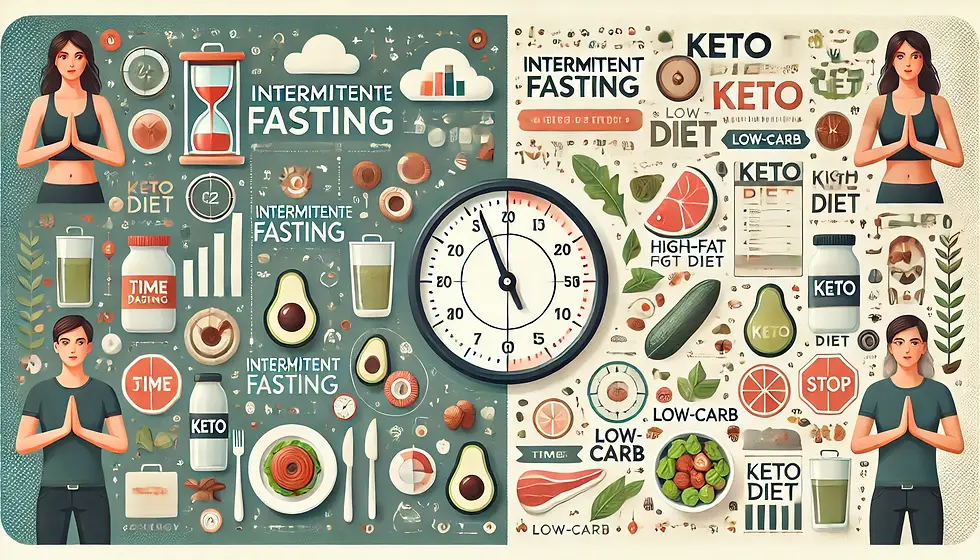Intermittent Fasting vs. Keto: Which Is Better for Weight Loss?
- Kautilya Upadhyay
- Feb 24
- 3 min read
Intermittent fasting (IF) and the keto diet are two of the most popular weight loss strategies, but they work in very different ways. If you’re stuck deciding between fasting schedules and carb-cutting, this breakdown will help. We’ll compare how each method works, their pros and cons, and what science says about their effectiveness—all in plain language!

What Is Intermittent Fasting?
Intermittent fasting focuses on when you eat, not what you eat. You cycle between periods of eating and fasting. Common methods include:
16/8 Method: Fast for 16 hours, eat within an 8-hour window (e.g., noon–8 PM).
5:2 Diet: Eat normally for 5 days, restrict calories (500–600) on 2 non-consecutive days.
How It Works for Weight Loss:
Boosts fat burning during fasting periods.
May reduce insulin resistance, helping your body use stored fat for energy.
What Is the Keto Diet?
The keto diet is a low-carb, high-fat eating plan designed to put your body into ketosis—a metabolic state where you burn fat instead of carbs for fuel.
Macronutrient Split: 70-80% fat, 10-20% protein, 5-10% carbs (under 50g net carbs/day).
Key Foods: Avocados, eggs, fatty fish, nuts, olive oil, and non-starchy veggies.
How It Works for Weight Loss:
Forces your body to burn fat by drastically cutting carbs.
Reduces hunger hormones like ghrelin, helping you eat less.
Intermittent Fasting vs. Keto: Head-to-Head Comparison
1. Speed of Weight Loss
Keto: Often leads to rapid weight loss in the first 1–2 weeks (mostly water weight). Long-term, studies show average losses of 1–2 lbs/week.
IF: Gradual but steady loss (0.5–1 lb/week), depending on calorie intake during eating windows.
Science Verdict: Both work, but keto may deliver faster initial results.
2. Sustainability
Keto: Hard to maintain long-term due to strict carb limits. “Keto flu” (fatigue, headaches) is common early on.
IF: More flexible—no food restrictions, just timing. Easier to stick to for busy lifestyles.
Science Verdict: IF wins for long-term adherence.
3. Side Effects
Keto: Constipation, bad breath (“keto breath”), nutrient deficiencies.
IF: Hunger pangs, irritability during fasting windows.
Science Verdict: IF has fewer reported side effects.
4. Muscle Preservation
Keto: High protein intake helps maintain muscle mass.
IF: May cause muscle loss if protein intake is too low during eating windows.
Science Verdict: Keto has a slight edge for muscle retention.
5. Health Benefits Beyond Weight Loss
Keto: May improve blood sugar control (good for type 2 diabetes).
IF: Linked to better heart health and reduced inflammation.
Science Verdict: Both offer unique perks, but IF has broader research support.
Which Is Better for YOU?
Choose Keto If You…
Love fatty foods and don’t mind cutting carbs (bye, bread!).
Want quick results and have a specific short-term goal (e.g., event prep).
Choose Intermittent Fasting If You…
Prefer flexibility in food choices.
Struggle with calorie counting or strict diets.
Pro Tip: Some people combine both! For example, follow a keto diet during your eating window.
Expert Tips to Maximize Results
For Keto: Track net carbs with apps like Carb Manager. Stay hydrated and replenish electrolytes.
For IF: Start with a 12-hour fasting window and gradually increase. Drink black coffee or tea to curb hunger.
For Both: Pair with strength training to preserve muscle and boost metabolism.
Conclusion
Intermittent fasting and keto can both help you lose weight, but they suit different lifestyles. Keto works faster but is tougher to maintain, while IF offers flexibility with steady results. The “best” plan is the one you can stick to long-term. Experiment, listen to your body, and focus on sustainable habits!
FAQs
Q: Can I do keto and intermittent fasting together?
A: Yes! Many people eat keto during their feeding window to accelerate fat loss.
Q: Which diet is better for women?
A: IF may be gentler for women, as extreme carb restriction can disrupt hormones.
Q: Will keto make me lose muscle?
A: Not if you eat enough protein (aim for 0.6–1g per pound of body weight).
Q: How long does it take to see results?
A: Keto: 1–2 weeks. IF: 2–4 weeks (consistency is key!).

Comments